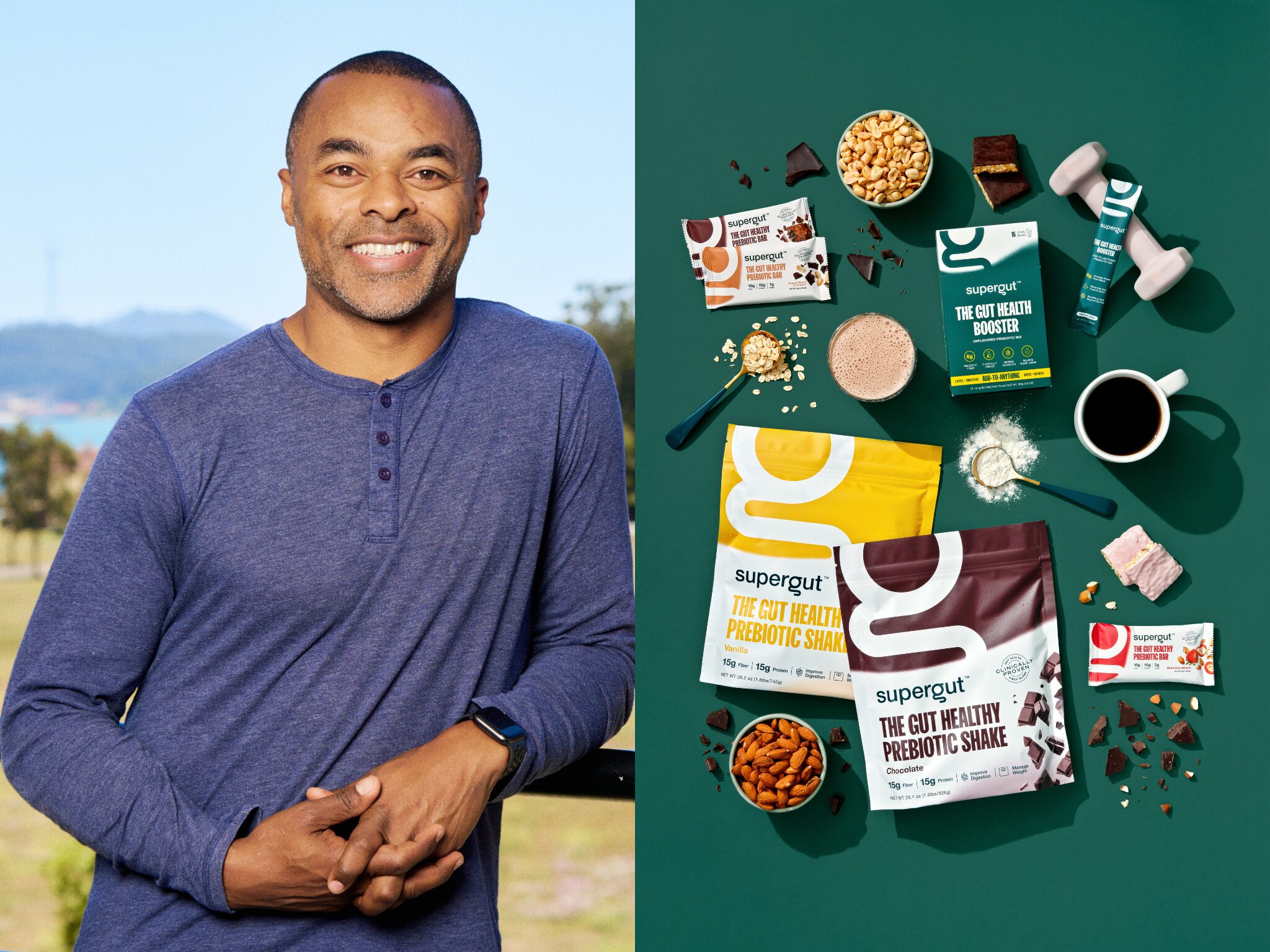Supergut’s Marc Washington is Meeting The Moment: ‘We’re Very Much Here for the Ozempic Era’
11 Mins Read
Marc Washington, CEO of superfood brand Supergut, speaks to Green Queen about riding the Ozempic wave, the importance of prebiotic fibre, boosting GLP-1, and formulating plant-based products.
For Marc Washington, it was a head-meets-heart story. His sister Monica lived with diabetes and hypertension and was clinically obese. Due to complications with her health and a high-risk pregnancy, she tragically passed away far too young.
“That tripped me to my core,” recalls Washington. “That was something that clearly should not have happened… I knew there had to be better ways, but nothing else allowed Monica to change her trajectory. ‘I think this is my purpose”, he thought at the time, “to help create something out of this tragic situation and help other people [towards] a healthier path where they’re more in control.’ In many ways, the kind of things that I wish Monica had access to while she was here.”
This painful part of his family history inspired Washington to start Supergut five years ago, a gut health brand leveraging prebiotic fibres for better digestive and metabolic health, and backed by nutritionists, scientists and medical professionals. Previously called MUNIQ – a portmanteau of ‘Monica’ and ‘unique’ – it was built upon the science of unique prebiotics, particularly resistant starches. These carbohydrates don’t get digested in the small intestine, but instead ferment in the large intestine to feed ‘good’ gut bacteria.
As MUNIQ, the business focused on supplements that transformed the gut, but also improved overall health, specifically targeting people “who need it the most”: those living with metabolic syndrome (a condition that affects a quarter of Americans). “I consider that phase an unbelievable proof of concept that this works,” says Washington. “We could take a food-as-medicine approach, and we can fundamentally transform people’s health in a significant way.”
But his goal was to impact broader public health. The more impactful way to do that was to be preventative and help people never get to the point where they’re living with metabolic syndrome. Prevention is better than cure, after all. In June 2022, the company rebranded to Supergut to focus on the mission.
In the second phase of the business, the idea was to transform focus from blood glucose or weight to the gut. “Whatever you’re dealing with in your life, we know that your gut microbiome has a significant role,” suggests Washington. The company carried out a peer-reviewed clinical study to validate “just how pervasively we could affect people’s health”.
Coming from a business background himself (with a supplements brand called Beachbody/BODi), he surrounded himself with scientific professionals to inform Supergut’s approach. “We really took more of a biotech approach, but just in the wrapper of a consumer brand,” says the Supergut CEO.
And it’s in the last few months that the Supergut has entered its third era, one where it’s creating gut-healthy superfoods as a “natural approach for appetite control”, which subsequently means better weight management, healthier blood sugar, and many other benefits. “We are doing that by helping naturally regulate your body’s production of these hormones in your gut called GLP-1,” explains Washington.
Is Supergut a natural Ozempic alternative?
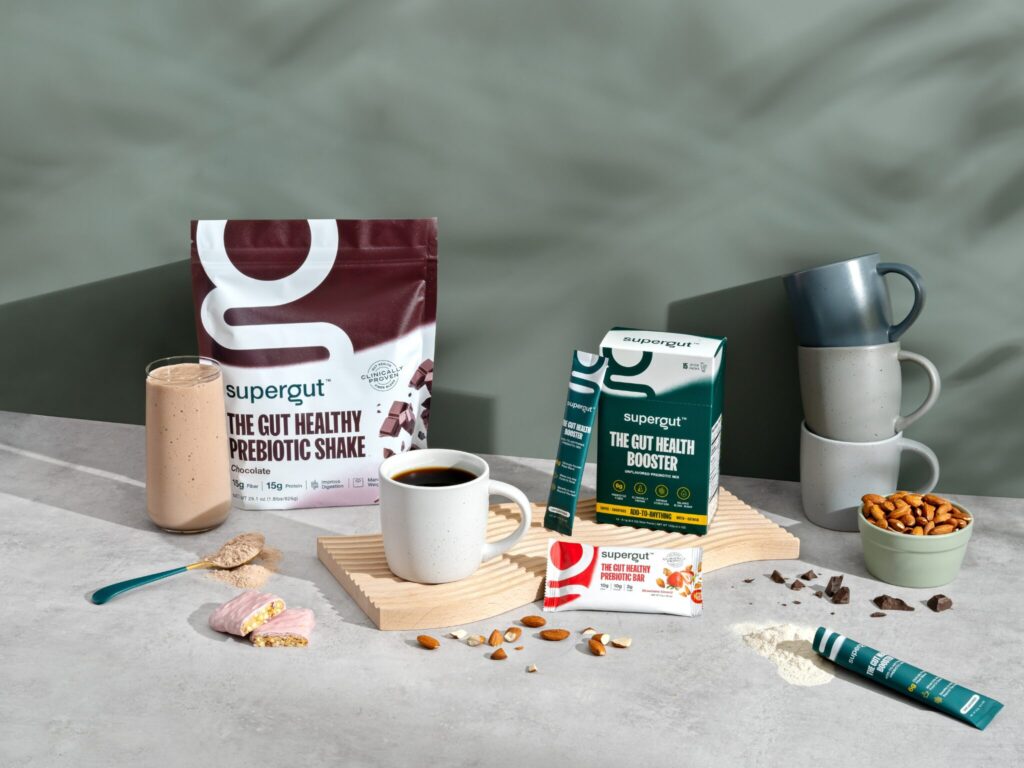
GLP-1 has been a buzzword in health discourse over the last year with the rise of drugs like Ozempic and Wegovy, which are prescribed to people with type 2 diabetes and obesity, but have become popular as weight-loss drugs: about 1.7% of American adults were prescribed one of these semaglutide (the drug’s generic name) medications in 2023.
Consumer awareness about GLP-1 is driving a step-change for Supergut, which is “made for these times”, according to Washington.
“We talk all day, every day about Ozempic: its impact on health, the secondary impacts on functional foods, its impact on our customers, how we complement it in some ways that we can be a natural alternative for somebody who doesn’t want to use them… We’re very much here for this Ozempic era.”
“We’re designing nutrient-dense, functional, high-protein, high-fibre, low-sugar foods that can amplify or complement the appetite control effects, but also balance out your digestive tract. That is Supergut.”
While the Supergut team was very familiar with the effects of GLP-1 hormones and their effects when it they first launched the company, Ozempic came onto their radar around two years ago. The company was conducting a 200-person “gold-standard” study using its shakes when one investigator who was impressed with the results mentioned breakthrough medications like Ozempic. Supergut spoke to leading experts in the field, who lauded these drugs’ transformative effects as well as “unbelievable promise” in weight-loss trials. As Washington puts it, “physicians were losing their mind”.
Washington and his team continued to focus on their product range before GLP-1 agonist drugs really exploded last year and forced Supergut to pay attention. The human gut has its own version of GLP-1, incretin hormones, which can be regulated with nutrients like dietary fibre and prebiotics like the ones Supergut is using, such as resistant starches and beta-glucans. “A big part of how [Supergut products are] actually doing their job at keeping you full, maintaining healthier weight and improving insulin response to manage blood sugar is GLP-1,” explains Washington.
The brand conducted a tongue-in-cheek stunt last year, branding its superfood bars as Wozempic. You know, Ozempic, minus all the woes. Those include the cost of the drugs, the needles and the side effects. “We’re saying: Hey, guess what? Our products help curb cravings, but we do it naturally,” says Washington.
It was a precursor to Supergut’s dialled-up brand positioning based on mimicking Ozempic. “This is a tsunami that’s about to take over not just pharma, it’s going to impact many people in broad, significant ways,” he notes. “So what are the secondary and tertiary effects of this? What’s the effect on food? People are going to eat less of certain types of food, but, they’re going to need more of other types of food, right? That’s us.”
A GLP-1 complement, not an Ozempic replacement
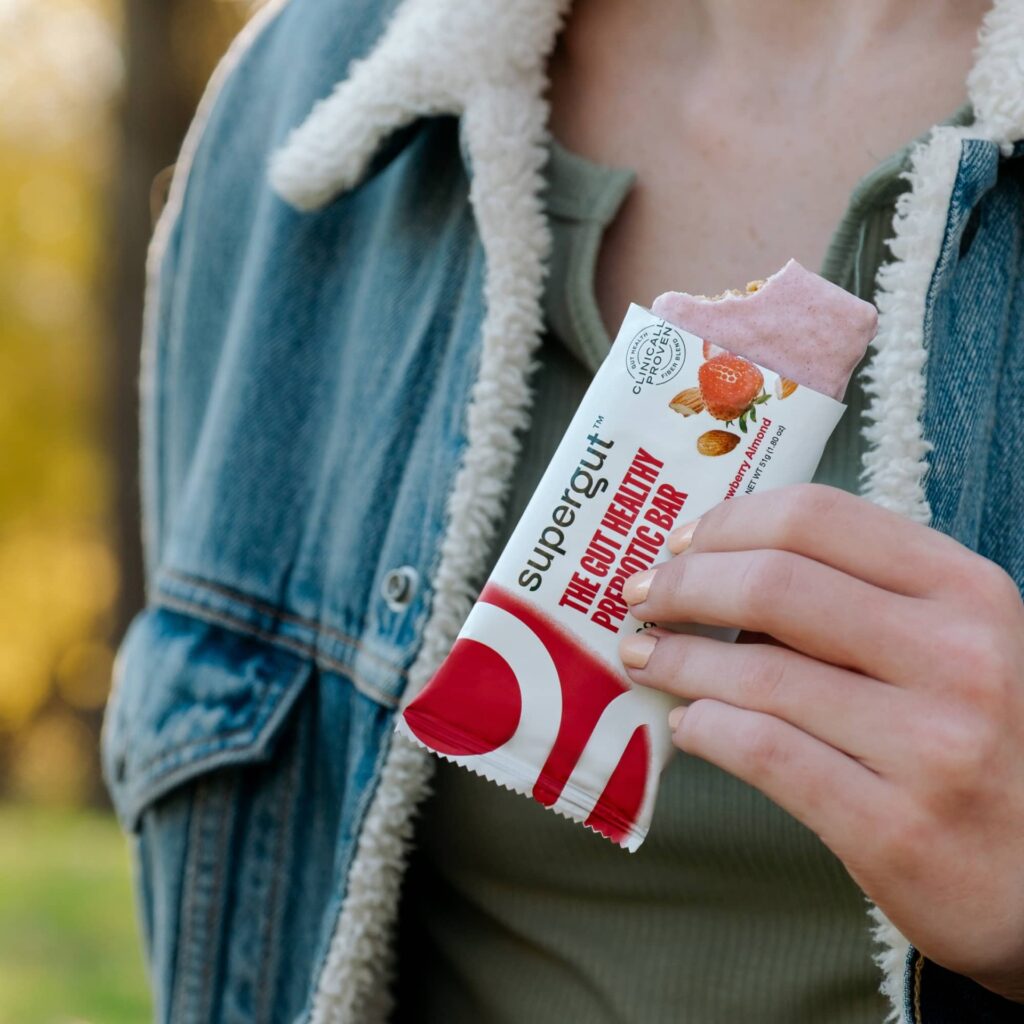
With all the focus on prebiotic fibre, it’s become an increasingly crowded CPG space – think Olipop, Pendulum, Uplift Food and Poppi, to name a few. Does this breed consumer confusion? Washington believes so, adding that this is not likely to change for the foreseeable future.
So how do Supergut’s products stand out? The idea is to focus specifically on the most efficacious types of prebiotic fibres that the body can tolerate at high concentrations. “You do need to get a fair amount of fibre in your diet in order to have some of these benefits,” he says. This is how the company landed on its unique, proprietary, patented resistant starch fibre blend (featuring green banana powder, beta-glucans from oats, soluble vegetable fibre from maize, and potato starch).
Supergut’s products help to diversify the prebiotic fibre content you’re ingesting and marry complementary elements like resistant starches and beta-glucan. This blend forms the base of its shakes, bars and add-to-anything powders.
The other aspect that differentiates Supergut, according to Washington, is the fact that the company has conducted primary clinical research, which revealed how its shakes can improve HbA1c (a measure of average blood glucose levels), appetite control, weight management (showing a steady decline instead of a massive dropoff), and blood pressure. “We also saw improvements in other dimensions connected to gut-brain access: better sleep quality, better energy, less brain fog,” he states.
“One thing we’re very clear about is this is not a replacement for Ozempic. This is not a magic pill. This is food. So this is going to work naturally in your body, and by no means are you going to just drink a shake and lose 20% of your body weight. They haven’t even made drugs that have been that effective, so clearly, you’re not going to get the same kind of results from a food product,” says Washington. “Plus from a regulatory standpoint, we have to be very careful. We don’t prevent, treat or cure any diseases. That is not us: we are loud and proud [about the fact] that we are a food.”
If you’re a semaglutide user, you might be wondering how complementation works with Supergut products. Washington suggests that Ozempic is, in effect, a Band-Aid, with studies showing that it does not “solve your metabolism”. When you come off the drug, the weight comes back on, a phenomenon dubbed the Ozempic rebound.
“We’re a very natural complement to help maintain and sustain those results over time, and tap into some of the same mechanisms, not at the same magnitude, but for healthier maintenance,” explains Washington. “And even while you’re on it, you need to get more nutrients from the fewer calories that you’re going to consume… it needs to be nutrient-dense – that is sort of our product.”
Then there are the side effects, which range from vomiting and nausea to constipation and diarrhoea. These can take months to subside, and for those who suffer longer-term, many end up withdrawing their use. The Supergut founder says its products can improve those digestive symptoms, something he ascribes to anecdotal evidence from the brand’s customers who also use Ozempic. The company hasn’t done any clinical testing on this aspect, but its research was done on consumers with metabolic syndrome, and it did showcase improvements in things like constipation, diarrhoea and nausea.
What about the Ozempic-curious? “A natural approach to appetite control and not walking around feeling hungry, maybe wanting to lose a couple [of] pounds – that’s relevant for almost every person with a heartbeat, right?” asks Washington. “We present that for them… It’s even relevant for a crowd that’s not going to use Ozempic per se.”
Opportunism, mixing prebiotics, and child use
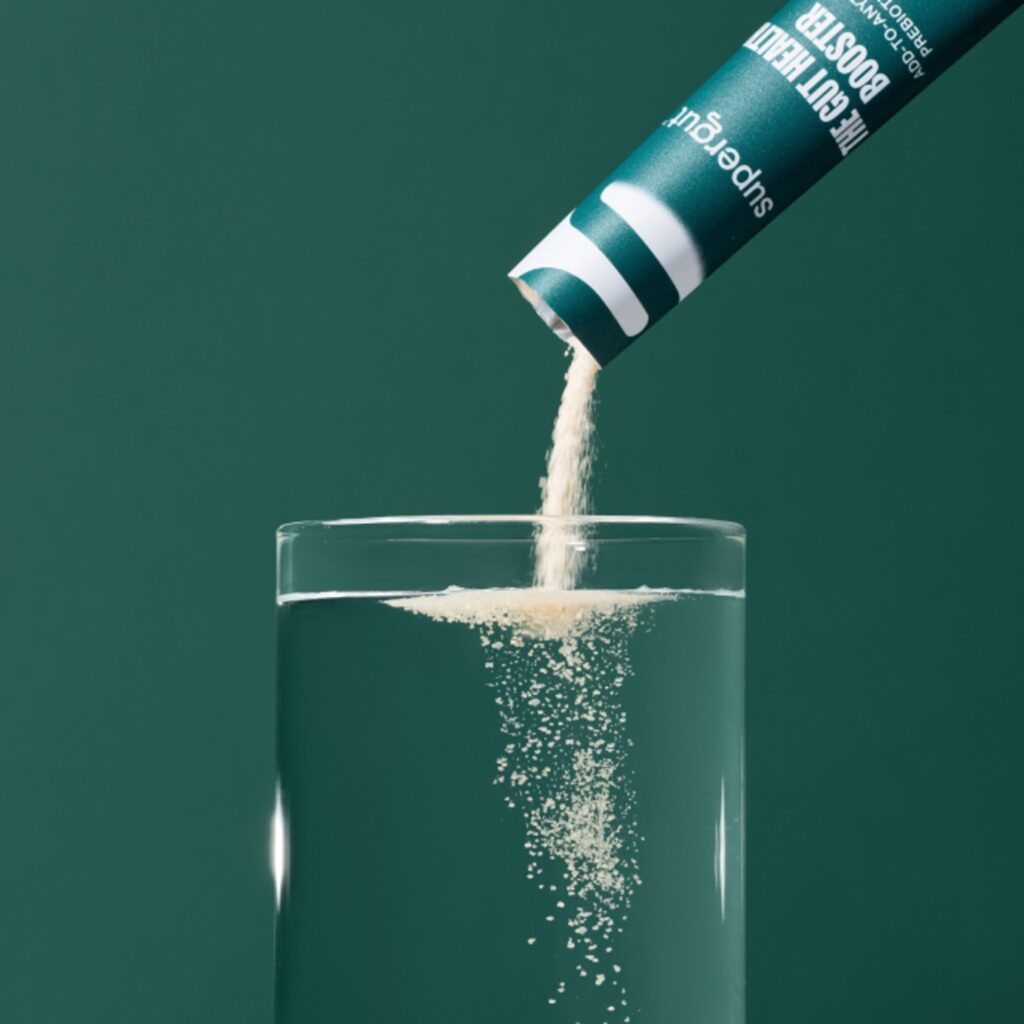
With more and more companies riding the Ozempic wave, could there be a case of opportunism in the GLP-1-food space? Washington doesn’t lose sleep over it – why would he? It’s inevitable, after all, he says. “Whether or not their products have anything to do with Ozempic or cravings or GLP-1, there are definitely people – and for sure, there will be more that come into the market – that do try to position themselves as GLP-1-complement,” he explains. “That’s the nature of business.”
Instead, Supergut aspires to be the “first brand you think of when you’re thinking of natural ways to control appetite, boost GLP-1, and also get some great gut health benefits” in the meantime. “Luck is when preparation meets opportunity – we have been preparing for this moment for five years,” says Washington. “We’ve been iterating, grinding, investing and preparing, and now I think it’s our opportunity.”
Asked if you can consume Supergut products alongside functional fibre offerings such as Olipop prebiotic sodas, Washington says it’s complicated. “That’s where it gets a little complex,” he responds. “The main thing people need to know is that all fibre is good, and we essentially need to get a lot more of it in our diets than we do.” When it comes to daily amounts, most recommendations average out at 30g. In the US, only 5% of adults meet that requirement from their daily diet, the average person gets 16g per day).
But while all fibre is good for you, there are different tolerability aspects of different fibres – even at relatively small dosages: some can cause bloating, gas, and other side effects – which is why you have to be careful combining fibres from different products. Getting the right blend is key, something Supergut has prioritised with its high-tolerance, certified low-FODMAP prebiotic fibre mix.
So to answer the question, the average person could potentially consume both Olipop and Supergut’s products, but if they did too much, it could start to present some issues. “What does have pretty solid evidence – and we’ve seen some of the research – is a diet high in fermented foods, if you really want to get more live microbes into your diet,” suggests Washington.
He adds that children can consume Supergut products too – only the serving size needs to be adjusted. “We typically recommend cutting the serving size in half,” he says. “Our bars have been quite popular [among kids]… because they’re like a sweet treat.”
With his kids, he adds the unflavoured prebiotic powder into smoothies, juices, drinks, sauces and oatmeal to get more prebiotic fibre into their diets. You can even bake with it. “There’s different ways to try to get this into the diets because… it’s not always easy to get them to eat their whole-food, high-fibre diets,” he says. “This helps supplement that by getting it in without them even knowing.”
Why Supergut isn’t 100% vegan
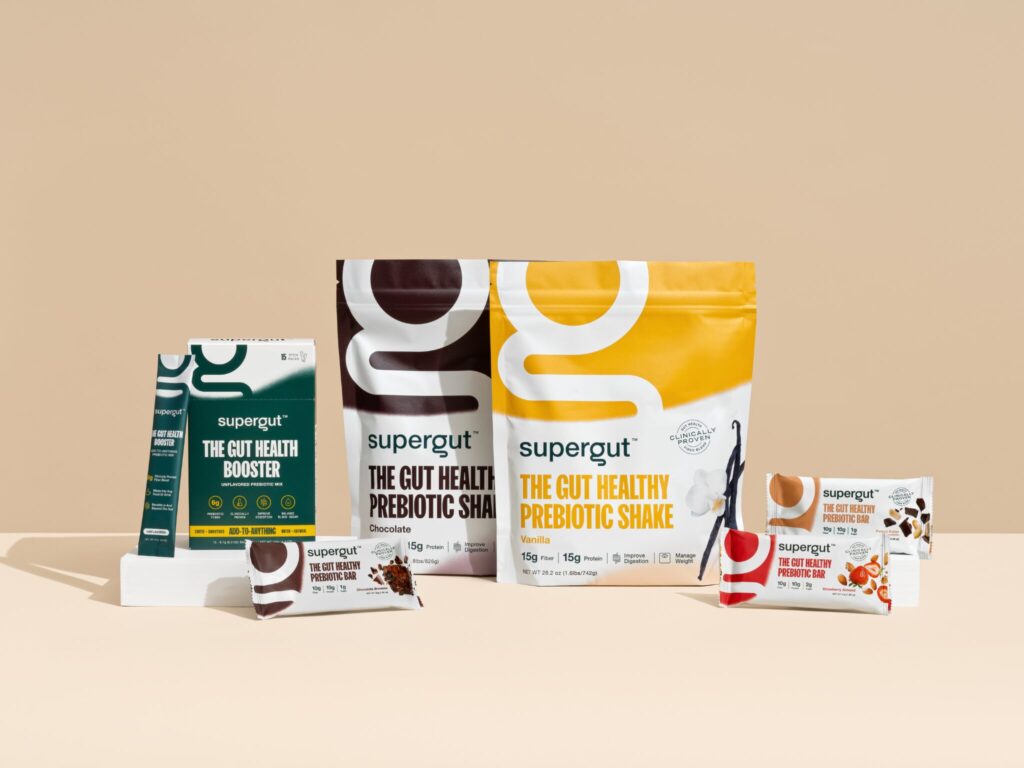
Supergut isn’t a fully plant-based brand – of its current range, the prebiotic fibre blend and some shake flavours are vegan. But for a country where 36% of people have lactose malabsorption, and between 80-90% of African Americans, Native Americans and Asian Americans are lactose-intolerant, how important is it to have a wider range of non-dairy products?
“We’re straddling the worlds of plant-based versus just general nutrition,” says Washington. He adds that a future fully vegan product line is possible. “I’m really trying to have the broadest impact possible at the end of the day, and so I tend to not focus too specifically on restrictions around diet or making things that aren’t available.
“From the very outset, I didn’t want to just create plant-based products, I wanted to create products that I think will have the broadest impact and exposure. And that means some plant-based, but some that are not plant-based. That sort of reflects my personal belief and our approach as a company.”
He cites food writer Michael Pollan’s much-repeated axiom: ‘Eat food. Not too much. Mostly plants’, calling the phrase “really, really powerful”, and reflective of his and the business’s outlook on a whole-food, plant-forward diet, “if not 100% vegan”. Having said that, the next couple of products in Supergut’s pipeline are plant-based versions of existing products.
Primed for success
With a five-year lead on gut health food products that naturally boost GLP-1 hormones, Supergut is very much meeting the Ozempic moment and the company is on track for robust commercial success. Washington says sales are up nearly threefold since Q3’23 “based on surging consumer awareness and interest around our gut-healthy, natural approach to curb cravings”.
The company recently launched in physical retail stores including Sprouts and Erewhon, and has additional upcoming launches at Bristol Farms, GNC and Fresh Thyme, going from zero retail shelves in 2023 to over 1,000 locations by the end of Q1’24, a rocketship momentum in CPG.
Can Supergut claim the ‘alternative Ozempic’ market? With more than 10,000 satisfied customers even before the semaglutide drug took over the world and orders for the brand’s bars exploding just in the last month alone, you wouldn’t bet against it.

